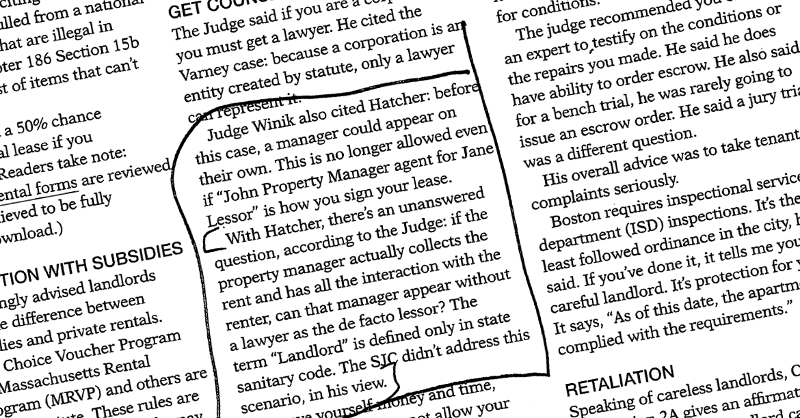Judge Winik Speaks on Landlord-Tenant Law and Housing Policy
First Justice Jeffrey Winik of the Eastern Division of the Housing Court spoke at MassLandlords Cambridge on Tuesday June 19, 2018. These notes were taken at the time and were not published previously but are still highly relevant. Any errors or omissions are MassLandlords’ own.

Judge Winik has been recognized by the Boston Bar Association for his work to prevent homelessness, support Lawyer for the Day, and advise the Tenancy Preservation Program. http://tippingthescales.bbablogs.org/tag/first-justice-jeffrey-winik/
Judge Winik was accompanied by his court room team: Assistant Clerk Andrea Gomes, Chief Housing Specialist Michael Neville, First Assistant Clerk Magistrate JoeAnn Smith, Assistant Clerk Thomas Trilla, and Assistant Chief Housing Specialist Alex Valderrama. Attorney Jordana Greenman moderated.
The Judge’s remarks covered a wide variety of landlord-tenant topics. He started by recognizing the event’s moderator.
“Attorney Greenman is a very talented, effective, and ethical lawyer,” he said.
Judge Winik then set out his basic presentation framework. He said, “Ownership and management of rental property is an honorable profession. We need housing and you’re entitled to be paid for the service you’re providing. That profession comes with responsibilities.”
Consistent with MassLandlords’ general advice that communication skills are important, the Judge said that court should be a last resort. He said you should also know that you will get a fair hearing, but that the law is very complex and nuanced.
Quoting the old adage, “A camel is a horse made by committee,” Judge Winik reminded us that a lot of the statutes we have to deal with are products of people who could not reach agreement. So the lawmakers fudged the wording. Don’t believe that you will understand every part of every law.
The Judge’s presentation was preceded by the MassLandlords repertoire presentation on eviction. Judge Winik referenced this at the start, rightly saying that the eviction timeline shown could be a three day-per week college course. Ten minutes is not enough to explain it all, and not enough background to attempt an eviction without counsel.
Housing Court
Housing Court is a set of courts dedicated to landlord-tenant law. The court was recently expanded to cover the whole state, so Judge Winik recapped the history. Housing Court started in Boston and Western Mass, and was later expanded to Worcester, the Northeast, and the Southeast.
He made a point of saying what is true, that District Court judges are very good, very smart people. He also said they don’t have time or support staff to handle evictions the way the Housing Court does. Housing Court focuses specifically on landlord-tenant law, in all its complexity.
The Housing Court staff had pushed for expansion for years without much success, until one day, the House Speaker said, “How about now?” The legislature signed expansion July 1, 2017 and the court was expected to start sitting that day. He expressed his view that we’ve done a remarkable job as a Commonwealth and are now hearing Housing Court cases all over Massachusetts.
At the time of presentation, some locations were still six to eight weeks away from opening: MetroSouth, Taunton and Quincy. All cities not covered by the original Housing Court have since been picked up.
Judge Winik said, “We made a commitment to provide the same service. It’s going to take time.” Some locations do not accept paper filings or experience other snags not encountered at the previous Housing Court locations.
Judge Winik reminded us that a lawyer who is experienced in housing law is worth their weight in gold. The Judge then started to detail the common problems he has seen.
Defective Notices to Quit
You need to give 30 days or a full rental period for a notice to quit with an at-will tenant. This notice period must end on a rent day. For instance, notice given on January 31 would be defective if set for March 1, because February is a short month. That notice would have to be April 1, or else served earlier in January.
Another problem with notices is not naming every renter. For instance, you can’t put two names on a lease and have only one signature on that document. Are both renters? This is so untidy as to be defective.
A final problem with notices is getting the address wrong. The notice is a technical document. You can’t mess up the street name, or use a nickname, or put the wrong unit number on a notice.
Illegal Leases
A common mistake is citing a lease violation on a lease pulled from a national service with clauses that are illegal in Massachusetts. Chapter 186 Section 15b gives you a whole list of items that can’t be in a lease here.
You have at least a 50% chance of making an illegal lease if you DIY, he warned. (Readers take note: MassLandlords rental forms are reviewed regularly and believed to be fully compliant on download.)
Pro Se Eviction with Subsidies
The judge strongly advised landlords understand the difference between federal subsidies and private rentals. The Housing Choice Voucher Program (Section 8), Massachusetts Rental Voucher Program (MRVP) and others are tenancies under statute. These rules are different. Notices to quit especially may have different requirements.
Judge Winik on Security Deposits
Judge Winik was blunt about Chapter 239 Section 8A, the security deposit law. He said, it’s the “Most poorly drafted statute in the Commonwealth. Vague and internally inconsistent. I have been looking at it since 1972, 1973. Ask yourself, ‘Do you need this?’”
Judge Winik emphasized the importance of complying with the security deposit statute from beginning to end. Notifications, pre-inspections, paying interest, complying with statement requirements, and returning only with the correct deductions all must be perfect.
He reminded the room that this statute is a strict liability statute. Even if you try to do it right, you’re liable for doing it wrong. Good intentions don’t cut it.
Be Organized
Judge Winik said he sees many unprofessional owners with no clear business records. Your records need to be clear and contemporaneous.
When he asks, “How much rent is owed?” you must give an exact number as of an exact date. If you say, “Around $1,500” or “since a couple of months ago,” you will have given a bad answer. In court you must be precise.
Get Counsel
The Judge said if you are a corporation, you must get a lawyer. He cited the Varney case: because a corporation is an entity created by statute, only a lawyer can represent it.
Judge Winik also cited Hatcher: before this case, a manager could appear on their own. This is no longer allowed even if “John Property Manager agent for Jane Lessor” is how you sign your lease.
[With Hatcher, there’s an unanswered question, according to the Judge: if the property manager actually collects the rent and has all the interaction with the renter, can that manager appear without a lawyer as the de facto lessor? The term “Landlord” is defined only in state sanitary code. The SJC didn’t address this scenario, in his view.]*
To save yourself money and time, the Judge advised you not allow your managers to represent you in court without an attorney. He said, “Even if I agree with you, the appellate court could address the jurisdiction issue whether it was asserted or not.” In other words, Judge Winik could decide in your favor on the merits, the renter could appeal, and the appellate court could find against you on the technicality of not having a lawyer. Hire a lawyer.
Judge Winik on Insufficient Service
A common problem is a notice to quit served by the landlord. A sheriff’s or a constable’s return of service is proof of delivery. Not so for a landlord. You’re in such a better position with a constable or a sheriff. Judge Winik joked, “‘The dog ate my notice.’ I’ve heard it!” He advised DIY landlords ask the tenant to sign and date a copy of the notice and have a witness.
Judge Winik added, “I’m surprised you don’t service notice to quit both certified and first class.”
The best advice is to forget witness, signatures, and two types of mail and just hire a process server.
Conditions Complaint
Note that a tenant doesn’t have to prove the reason they withheld rent (e.g., loss of job). He said 90% of the cases where he has seen rent withholding with Section 8, it’s almost never intentionally withholding for conditions.
The judge recommended you bring in an expert to testify on the conditions or the repairs you made. He said he does have ability to order escrow. He also said for a bench trial, he was rarely going to issue an escrow order. He said a jury trial was a different question.
His overall advice was to take tenant complaints seriously.
Boston requires inspectional services department (ISD) inspections. It’s the least followed ordinance in the city, he said. If you’ve done it, it tells me you’re a careful landlord. It’s protection for you. It says, “As of this date, the apartment complied with the requirements.”
Retaliation
Speaking of careless landlords, Chapter 239 Section 2A gives an affirmative defense to renters. A landlord can’t take adverse action against a tenant because the tenant was 1.) organizing, or 2.) complaining to a municipality, even if the complaint is without merit. The judge can allow eviction even with a retaliation claim based on the landlord’s earnestness and the details of the case.
Judge Winik Event Conclusion
Overall, the Judge and his team were friendly, funny, and enormously knowledgeable. They covered the Housing Court expansion, court process, and landlord-tenant law mistakes. The Judge and team received 100% positive feedback on our feedback cards. We hope this summary will be useful to you in court. May you never need it.
* This section will be the subject of an erratum to be published May 2019.
Judge Winik Article Erratum
In the March 2019 edition of this newsletter, we may have mis-reported or misconstrued comments made by Judge Winik with respect to the Hatcher case. We wrote,

“The Judge said if you are a corporation, you must get a lawyer [in eviction proceedings]. He cited the Varney case: because a corporation is an entity created by statute, only a lawyer can represent it.
“Judge Winik also cited Hatcher: before this case, a manager could appear on their own. This is no longer allowed even if ‘John Property Manager agent for Jane Lessor’ is how you sign your lease.
“With Hatcher, there’s an unanswered question, according to the Judge: if the property manager actually collects the rent and has all the interaction with the renter, can that manager appear without a lawyer as the de facto lessor? The term ‘Landlord’ is defined only in state sanitary code. The SJC didn’t address this scenario, in his view.”
These paragraphs seemed wrong to some readers. Surely the second paragraph ought to have cited LAS, not Hatcher? And as for the third paragraph’s discussion of Hatcher, surely the judge would not have asked this? The question in that case was whether a property manager can appear in court for the lessor, and the answer decided in that case was no.
As we cannot go back in time to relisten to the judge’s comments, and as it would be an impertinence to ask a sitting judge to explain a statement he may not have made, the editors of this publication wish to place an asterisk on that original article and discuss the issue briefly as follows, but without ultimate resolution as to what the judge actually said or meant:
Since Varney Enterprises, Inc. vs WMF, Inc. (1988), no corporate owner or lessor has been allowed to proceed with eviction without an attorney.
Since LAS Collection Services v Pagan (2006), no individual has been allowed to proceed with eviction on behalf of another “as agent”.
Hatcher decided the following question: If an individual (non-corporate) property manager signs the rental agreement personally, is that property manager a lessor, and allowed to appear in court without a lawyer? Yes, the manager can appear without a lawyer if they are on the rental agreement, i.e. a de jure lessor.
On the other hand, if an individual property manager has not signed the rental agreement but acts like the lessor/landlord in every sense and has every action and interaction with the renter, is that manager the de facto lessor/landlord? In Hatcher, the Supreme Judicial Court did not consider this fact pattern or define these terms.
We know that in some circumstances a court may consider a property manager to be a landlord. For instance, under “Common Pitfalls of Housing Court Practice” by Stephen Carreiro and Hon. Manuel Kyriakakis, 2nd Supplement 2006, in the section “The Filing of a Complaint,” we read:
“There is no exception for anyone but the owner or an attorney for the owner to sign the summary process summons and complaint. On the other hand, it should be remembered that one does not have to have title to be the landlord. Managers can thus bring summary process actions, not in their roles as managers, but as landlords. If the manager has been authorized by the owner to control the property, rents out the apartment, and has assumed the responsibility and liability for the care of the property, then the manager is in fact the landlord, and in this capacity is authorized to bring an eviction action.”
That was written before the Hatcher decision, of course. But exactly how a property manager who is not a signatory to the lease/rental agreement might be deemed to be a landlord/lessor remains an open question.
We have tried unsuccessfully to find statutory definitions for the words “landlord” and “lessor” (in connection with real estate, not goods). A future decision may elucidate what it means to be a landlord or lessor, and settle this and other questions.





I don’t know who this judge thinks he is acting like he’s in a position to tell ANYone how things should work.
He caused me immense damage at the Boston Housing Court when I, as a Section 8 recipient with a very thin wallet, was trying desperately to protect my life against a landlord who would not remediate a stachybotrus mold contamination in my apartment, and was responding with abuse instead.
I had to pay myself to have a certified company and lab test the apartment, who verified the contamination. I was so sicken court I could hardly stand up. But I trusted the system.
However, unlike the landlord, I could not afford an attorney and was alone in court.
Judge Winik immediately made it very clear to the landlord that he understood very well that “[she] was “there to protect her investment.”He made no mention of my trying to protect my life. Judge Winik refused to take my report into evidence saying, “How do I know that is an accredited company?”, rather than looking at the report or doing some homework. He dismissed my case in a flash. It was so fast I could feel the hurt rampage throughout my soul. I was badly taken advantage of.
I had gone to mediation prior to court to satisfy Judge Winik, but the Mediator (Catarina Andrade) was controlling and dominating and instructed me that “Everything said in this room” must stay here. She was so hostile towards me during the mediation that I finally asked her why she was acting this way. She responded that I had “judged” her and her co-workers on the day I filed my paperwork.
No, I was not even thinking about you. The Universe does not center around you and your co-workers’ distorted thinking, inadequacies and subsequent resentments towards white women. Those are issues which center in YOUR mind, not mine. It is not ABOUT you. That courtroom is there to protect people, and if you do not understand that, then quit.
Judge Winik keeps very sick Latina women around him with serious personal issues, and this affects the outcomes of people’s hearings.
During court, Ms. Andrade was smiling at my landlord, making it silently clear that she was siding with them. After the horrible outcome of my hearing, I went to speak to someone about her behavior. She suddenly appeared out of nowhere, pulling me into a side room to “talk”. There, I was immediately subject to more of her hostility as I stood there silently not understanding why any of this happened. She waved her finger at me and stated, “You better do what I tell you. I have influence over the judge.”
Really? Is that they way things work around here?
Because Jeffery Winik is unethical, my landlord went without consequences. She ramped up her emotional abuse and had her attorney send me a letter saying I was not to contact her (to confront her abuse or protect myself emotionally) and they begin an eviction process against me. I was put out on the streets with nowhere to go.
Many years ago, my father (who is a very powerful but decent man) took a phone call in my presence. When he hung up he said something which was totally out of character for him and which I will never forget. He said, “Ellen, they’re all whores.”